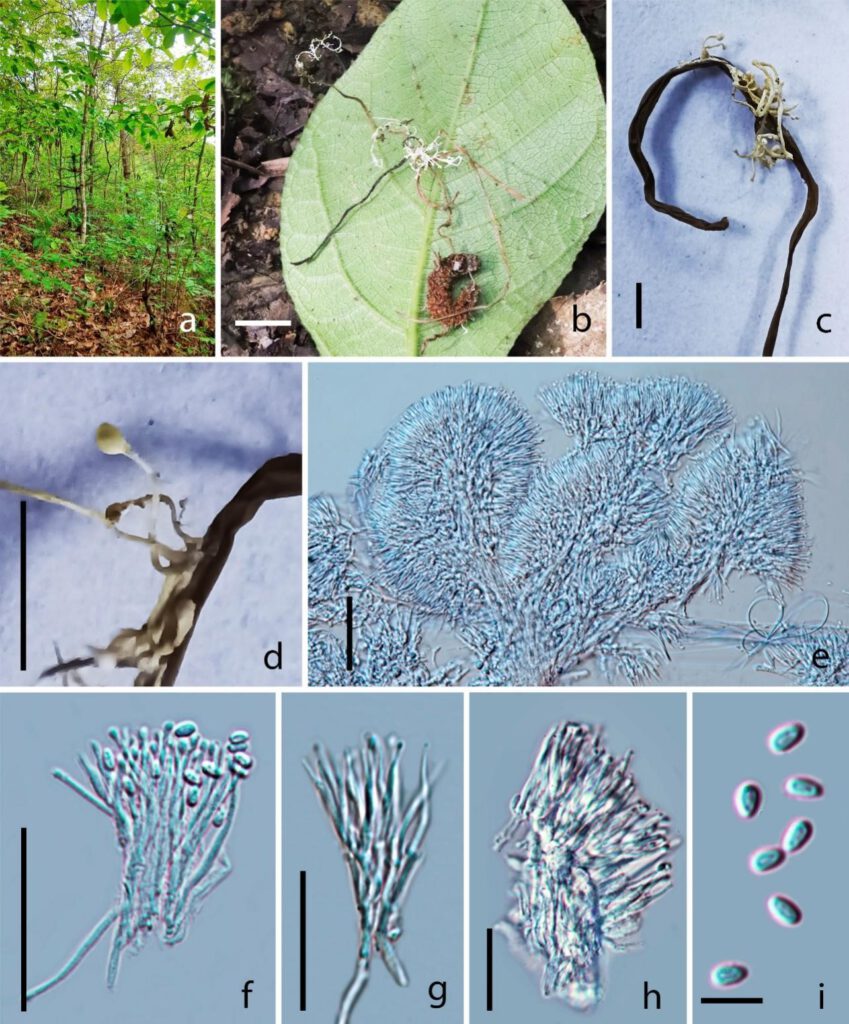Fungalpedia – Note 100 Polycephalomyces
Polycephalomyces Kobayasi
Citation when using this entry: Xiao et al., in prep – Fungalpedia, invertebrate fungi. Mycosphere.
Index Fungorum, Facesoffungi, MycoBank, GenBank, Fig 1.
Polycephalomyces was introduced as an entomopathogenic genus with one species obtained from Japan, characterized by polycephalous synnemata (Kobayashi 1941). Several additional species were described and later, Perennicordyceps was segregated from Polycephalomyces with four species (Matočec et al. 2014). Pleurocordyceps was segregated from Polycephalomyces with ten species (Wang et al. 2021). Xiao et al. (2023) established a new family, Polycephalomycetaceae, to accommodate these three genera based on morphology and phylogenetic analyses of a combined ITS, LSU, SSU, rpb1, rpb2 and tef 1-α sequence data. Polycephalomyces is the type genus in Polycephalomycetaceae (Xiao et al. 2023). Polycephalomyces is an asexual morph with phialidic conidiogenous cells and oblong to cylindrical conidia (Kobayashi 1941, Xiao et al. 2023). Nine Polycephalomyces taxa are listed in Species Fungorum (2023). These species are distributed in America, China, France, Ghana, Japan, Russia and Sri Lanka.
Type species: Polycephalomyces formosus Kobayasi
Other accepted species:
Polycephalomyces albiramus Y.P. Xiao, T.C. Wen, J.Z. Sun & K.D. Hyde
Polycephalomyces baltica Poinar & Vega
Polycephalomyces cylindrosporus Samson & H.C. Evans
Polycephalomyces ditmarii Van Vooren & Audibert
Polycephalomyces paludosus Mains
Polycephalomyces ponerae Z.Q. Liang, W.H. Chen, J.D. Liang, Y.F. Han & X. Zou
Polycephalomyces ramosus (Peck) Mains
Polycephalomyces tomentosus (Schrad.) Seifert
Figure 1 – Polycephalomyces formosus (Specimen examined – China, Guizhou Province, Zunyi City, parasitic on Ophiocordyceps multibrachiata on Lepidoptera in soil, 22 October 2020, Qingfeng Meng, GACP 21-WFKQ03, GACP 21-WFKQ04) a Habitat of Polycephalomyces formosus. b Synnemata emerging from infected Ophiocordyceps multibrachiata. c, d Synnemata. e Vertical section of synnemata. f-h Conidiophores. i Conidia. Scale Bars: b, c = 1 cm, d = 5 mm, e = 50 µm, f-h = 20 µm, i = 5 µm.
References
Kobayasi Y. 1941 – The genus Cordyceps and its allies. Sci Rep Tokyo Bun Daig Ser B. 84, 53–260.
Matočec N, Kušan I, Ozimec R. 2014 – The genus Polycephalomyces (Hypocreales) in the frame of monitoring Veternica cave (Croatia) with a new segregate genus Perennicordyceps. Ascomycete org 6, 125–133.
Wang YH, Sayaka B, Wang WJ, Li Y et al. 2021 – Pleurocordyceps gen. nov. for a clade of fungi previously included in Polycephalomyces based on molecular phylogeny and morphology. Journal of Systematic Evolution 59, 1065–1080.
Xiao YP, Wang YB, Hyde KD et al. 2023 – Polycephalomycetaceae, a new family of clavicipitoid fungi segregates from Ophiocordycipitaceae. Fungal Diversity, 1–76.
Entry by
Xiao YP, School of Pharmaceutical Engineering, Guizhou Institute of Technology, Guiyang 550003, China
(Edited by Kevin D. Hyde)
Published online 19 September 2023
